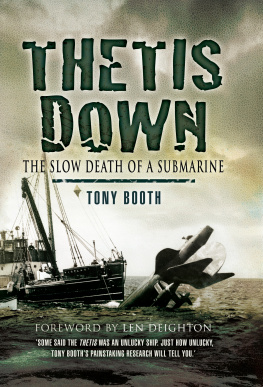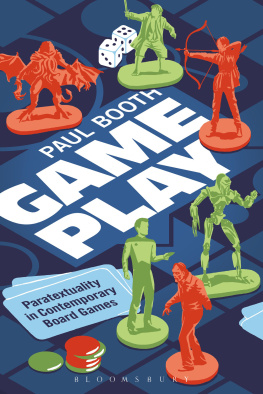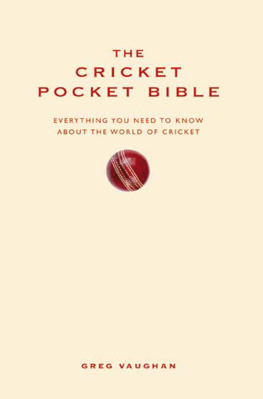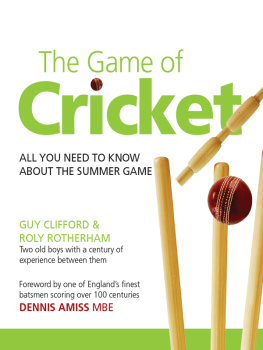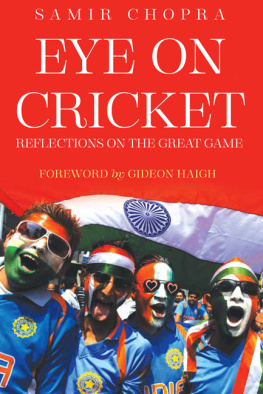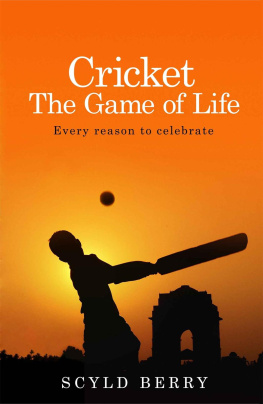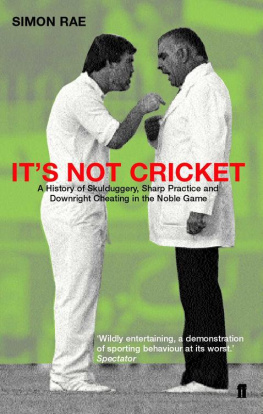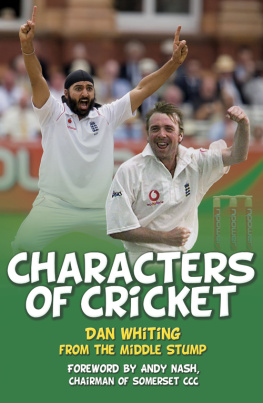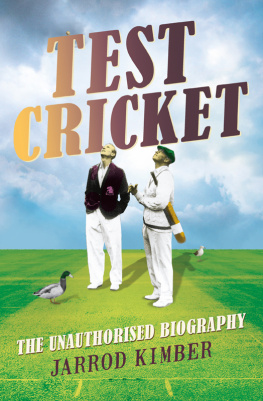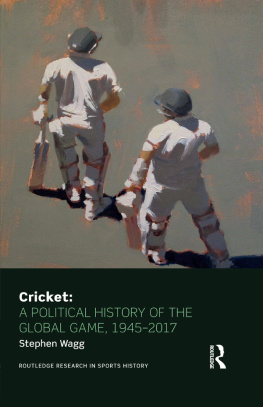CRICKET, LOVELY
CRICKET?
An Addicts Guide to the Worlds Most Exasperating Game
Lawrence Booth
Contents
This ebook is copyright material and must not be copied, reproduced, transferred, distributed, leased, licensed or publicly performed or used in any way except as specifically permitted in writing by the publishers, as allowed under the terms and conditions under which it was purchased or as strictly permitted by applicable copyright law. Any unauthorised distribution or use of this text may be a direct infringement of the authors and publishers rights and those responsible may be liable in law accordingly.
Version 1.0
Epub ISBN 9781448103034
Published by Yellow Jersey Press 2009
2 4 6 8 10 9 7 5 3 1
Copyright Lawrence Booth 2008
Lawrence Booth has asserted his right under the Copyright, Designs and Patents Act 1988 to be identified as the author of this work
This book is sold subject to the condition that it shall not, by way of trade or otherwise, be lent, resold, hired out, or otherwise circulated without the publishers prior consent in any form of binding or cover other than that in which it is published and without a similar condition, including this condition, being imposed on the subsequent purchaser
First published in Great Britain in 2008 by
Yellow Jersey Press
Random House, 20 Vauxhall Bridge Road,
London SW1V 2SA
www.rbooks.co.uk
Addresses for companies within The Random House Group Limited can be found at: www.randomhouse.co.uk/offices.htm
The Random House Group Limited Reg. No. 954009
A CIP catalogue record for this book is available from the British Library
ISBN 9780224079150
To Alex, Francis and Ben
Sometimes, when I feel a little exhausted with it all and the worlds sitting heavily on my head, I pick up a Wisden and read about Len Huttons 37 in 24 minutes in Sydney in 1946.
Harold Pinter
If [AE Housman] means us to understand that cricket, and cricket alone, has prevented men from committing suicide, then their continuation on this earth seems hardly worthwhile.
Edith Sitwell
God, this is boring.
A former girlfriend
About the Book
Cricket, Lovely Cricket is a sports book with a difference an original and engaging journey around the perennially curious world of cricket, leaving no metaphorical leg-break unturned and peering at the game from every conceivable angle. Here, Lawrence Booth, who had little option but to turn a youthful obsession with the game into a means of paying the mortgage, seeks to consider the questions that crop up on a daily basis but rarely receive a satisfactory answer. What are the players really like? What is the secret of sledging? Why get so worked up about the Ashes? Why all the clichs? And how did India take over the world?
Fittingly, for a sport that can last up to five days without a result, Cricket, Lovely Cricket is all-embracing but probing, humorous but insightful, sweeping but reflective. It is underpinned by the essential and slightly frightening truth that cricket does not actually matter at all, yet continually finds itself relating the game to the wider world. By examining what cricket tells us about the nations who spend vast chunks of their existence fretting over the fate of a small red ball, it attempts to get to the heart of a sport that seems more capable than any other of bewitching its followers.
Full of stories, observations, jokes and whimsy, this book is a captivating look at the way in which the game has become what it is today and what, given a fair wind, it might be like in the future.
About the Author
Lawrence Booth writes on cricket for the Guardian and the Sunday Times. In addition to his print work, he writes the Spin, the Guardian websites irreverent cricket email, and has frequently contributed to their acclaimed over-by-over coverage. A regular writer in Wisden, he is the author of two previous books. He lives in south-west London.
Also by Lawrence Booth
Cricket: Celebrating the Modern Game
Around the World
Arm-ball to Zooter:
A Sideways Look at the Language of Cricket
I NTRODUCTION
LETS START ON the train. If you like cricket enough to be reading this book, Im guessing youve been there yourself. You know, staring out of the window watching the world flash by when you catch sight of a green field and some men dressed in white. Admit it: you want to find out what happens next. That next ball, delivered by a complete stranger in the middle of nowhere, begins to consume you. It shouldnt, of course, but you cant help yourself. You simply have to know what the batsman does to it before the cricket match and the train go their separate ways. Youre even prepared to risk a quizzical look from the passenger opposite by craning your neck to catch a glimpse. But thats the thing about the next ball. And who invented train etiquette anyway?
Your rational side kicks in, or at least it tries to. Its only a game, you tell yourself, and there must be, what, a thousand of them taking place all over the world this Saturday. Knowing the fate of the next ball is not going to change your life. Still, the bowler really is taking a long time about it. Get a move on, mate. You try to lighten the mood by rolling your eyes at your co-passenger, who averts his. After all, one of the first rules of watching cricket from the train is that the bowler is always 60 and has a dodgy leg. Run, for chrissake! You mutter this a bit too loudly, but you know you know! that by the time the bowler gets to the crease youll only be able to see the wrong half of the pitch. Youll have to work out whats happened next from the reactions of the fielders and possibly the square-leg umpire, assuming he hasnt disappeared out of sight too. And what good will that be? Oh God, panic sets in. Questions swim round your head. What if the fielders are a shy lot and barely celebrate even when all three stumps are out of the ground? What if they like to appeal for everything and go up for a silly lbw, by which stage you will be able to see no more than a handful of spectators on the boundary, and who knows which side theyre barracking for? Not that theyre much use anyway: most of them are dozing in deckchairs. The sadder part of you, the part you would prefer to leave at home on a first date, considers the emergency handle. But by now its too late. Face facts: the next ball will only ever be a construct of the mind.
I know you didnt see it, but how was the next ball for you? Did the batsman dead-bat it or square-cut it for four, or was he bowled offering no stroke? Because, at the risk of sounding like an American self-help manual, your decision might tell you something about the real you. If, for example, youve always reckoned yourself to be the next Kevin Pietersen, youll have imagined a disdainful flick through midwicket. If its Brett Lee who takes your fancy, the inswinging yorker will have come to mind. Me? I like to think the batsman became the first in the history of village cricket to be given out for obstructing the field, before hurling his bat to the ground and storming off, pausing only to give a few choice quotes to the bloke who writes the club newsletter. But then Im a cricket journalist. You might also have guessed Im a cricket lover too, one who will defend the game until he develops a slightly evangelical glint in his eye, or at least until the arthritic sexagenarian finally hobbles to the crease. It is a combination which means I get gently teased for being a fan with a laptop by colleagues who regard any show of enthusiasm for cricket as a flaw that should disqualify you from the job of writing about it. (Hey, dont all fashion journalists hate clothes, restaurant critics loathe food and lobby correspondents detest politics?) But it is as it is, and Im pretty sure the strange lure of the next ball will never leave me.



